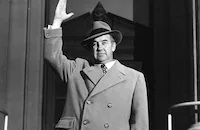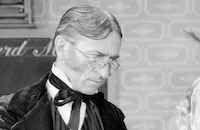Anna Lucasta
Cast & Crew
Irving Rapper
Paulette Goddard
William Bishop
John Ireland
Oscar Homolka
Broderick Crawford
Film Details
Technical Specs

Synopsis
The Lucasta family--father Joe, mother Theresa, their two children Stanley and Stella and their spouses Frank and Katie--receives a letter from Joe's old friend Strobel, stating that his son Rudolf is coming to their city in Pennsylvania. The friend asks Joe to find a good wife for Rudolf and mentions that he will arrive with $4,000. In order to get the money for themselves, Theresa suggests that Anna, their "black sheep" daughter, be brought home as a prospective wife for Rudolf. Joe, who hates Anna, refuses to consider the idea until Frank beats him up. Anna, meanwhile, is working at a Brooklyn bar called the Noah's Ark when sailor Danny Johnson, a regular customer, tells her that he has saved enough money to go back to taxi driving. Contrary to Anna's expectations, Danny does not ask her to marry him. While Anna is dancing with Danny's friend Buster, Joe arrives and asks Anna to come home. Because she is broke and locked out of her apartment, Anna agrees to return, and quickly learns the reason for Joe's request. When Rudolf arrives, the family is surprised to learn that he is not a naïve man from the country, but a college graduate who plans to work the family farm in addition to teaching at the local school. After Stanley and Frank are fired from their jobs, they unsuccessfully try to con Rudolf out of his money. Rudolf is attracted to Anna, despite Joe's drunken warning to keep away from women like her. Insulted by her father, Anna escapes to the hotel bar for a drink. Rudolf follows, and the two dine together. The next day, Rudolf takes Anna on a tour of the farm and proposes marriage. Anna does not answer, however, and that night, recalls the event that caused her to leave home: Having been locked out of the house after a dance, she gets a spare key from the shed. There, her date kisses her, and they are found by her father, who angrily vows never to let her date again. This unpleasant memory compels Anna to leave town, but while she is waiting for the train, Rudolf arrives and persuades her to marry him. Before the wedding, Rudolf gives Anna his money, which is later stolen. While all the Lucastas except Joe are attending the wedding, Danny comes looking for Anna. Danny's presence convinces Joe of Anna's worthlessness, and when Anna and Rudolf return, Joe tells her that he took Rudolf's money and vows to expose her past to the school principal and ruin Rudolf unless she leaves immediately with Danny. Vowing never to see her jealous father again, Anna leaves with Danny. Some time later, Rudolf searches Brooklyn for Anna. He waits for her to return to Noah's Ark, but eventually gives up, leaving behind a letter that discloses Joe's death. When Anna arrives at the bar, Noah, the bartender, reads the letter to her and then dials the number of Rudolf's hotel. After learning that Rudolf has checked out of the hotel, Anna leaves for the night, believing that she has lost her chance for happiness. Rudolf is waiting outside, however, and calls her name. The two walk off together.

Director

Irving Rapper
Cast

Paulette Goddard
William Bishop

John Ireland

Oscar Homolka

Broderick Crawford

Will Geer

Gale Page

Mary Wickes

Whit Bissell
Lisa Golm
James Brown
Dennie Moore

Anthony Caruso
Grayce Hampton
Jean "babe" London
Joe Mcturk

Olin Howlin
Jean Andren
Harry Cheshire
William Cabanne
Esther Dale
Joe Ploski
Crew
George Brooks
Clay Campbell
George Cooper
David Diamond
Helen Hunt
William Kiernan
Arthur Laurents
Jean Louis
Charles Nelson
James Nicholson
Sol Polito
Morris Stoloff
Philip Yordan
Philip Yordan

Film Details
Technical Specs

Quotes
Trivia
Notes
Philip Yordan's stage play Anna Lucasta was written in 1936 about a Polish family, but failed to get a Broadway opening until June 8, 1944, when it was staged by the American Negro Theater in the basement of the 135th St. Library in Harlem with an all-black cast. For the film, the play's original Polish-American characters were reinstated. Hollywood Reporter news items provide the following information about the production: The film was slated to begin production early in 1948, but the production was delayed several times due partly to Paulette Goddard's prior commitments. A September 29, 1948 Hollywood Reporter news item reported that negotiations for Susan Hayward to star had been concluded. According to the same item, Linda Darnell and Rita Hayworth had also been considered for the lead. The film finally went into production in January 1949 with Goddard in the lead. Other news items note that Gig Young was tested for a role, and that William Dieterle was announced as the film's director.
Material included in the MPAA/PCA files at the AMPAS Library adds the following information about the production: In a November 7, 1944 letter to Paramount producer Hal Wallis, PCA director Joseph I. Breen stated that the play would not be acceptable material for a film because of the "general, overall low tone and immoral flavor of the story," particularly its depiction of Anna's prostitution, frequent use of vulgarities and blasphemies, portrayal of one character as a pimp, and suggestion of an incestuous relationship or desire on the part of Joe toward Anna. In the original play, Anna is clearly portrayed as a prostitute and it is Joe's incestuous feelings toward his daughter that cause the split between them. The Hollywood Reporter review states, "so much of the story has to be implied rather than stated, that it winds up resorting to melodramatic cliches." Subsequent to Paramount's inquiry, almost every studio in Hollywood submitted the play to the PCA and received a copy of the same letter.
In a July 7, 1947 letter to the MPAA, Philip Yordan made a plea for a film version of his play, stating that "the immoral elements of open prostitution, incest and the characterization of the pimp were completely absent from my original version. It is my full intent and purpose to eliminate these unwholesome elements from the screenplay." Despite Yordan's statements, the published play contains the elements proscribed by the MPAA. According to a January 30, 1949 New York Times article, the PCA suggested to Yordan that if the screenplay stressed the "danger of a narrow-minded and repressive attitude toward children by foreign-born parents," it would be given "the widest possible latitude in telling the story." According to a Los Angeles Examiner article, the property was bought in July 1947 by producer Robert Kane as a Twentieth Century-Fox release. Columbia then purchased the play's screen rights in October 1947, and subsequent submissions of Yordan and Arthur Laurent's screenplay were deemed acceptable by the MPAA with minor changes. Another adaptation of Yordan's play was made in 1958 by UA, featuring a black cast headed by Eartha Kitt and Sammy Davis, Jr. and was directed by Arnold Laven.












